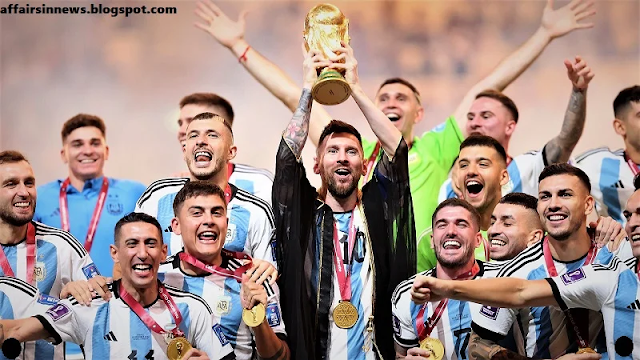Losing in the first round shows his ability Former cleaner and Saudi coach's way of life
On 30 November, Saudi Arabia lost to Mexico 2-1 in Group C of the World Cup Qatar.
Wearing his trademark white shirt, Saudi Arabia's coach Renard stood on the edge of the touchline and made large, fierce gestures as he gave instructions to his players.
They defeated Argentina, who are favourites to win the title with Messi, in their first match of the first round on the 22nd, calling it "the biggest upset in history". The next day, Saudi Arabia was in such a state of public holiday that the French coach insisted, "We are still the weakest team in this group (Group C), and if we don't keep our humility, we won't be able to play a good match."
In the second match, Poland showed the difference in strength. In the third and final match, they conceded consecutive goals in the second half as Mexico's onslaught increased, and ended the tournament in fourth place in Group C with a 1-2 record. "I dreamed of reaching the playoffs again for the first time since 1994, but I didn't qualify for a match like today," Renard said.
The 54-year-old has never lacked respect for the "great powers" of Europe and South America. That's why I snorted, "I want to close the gap as much as possible at this World Cup." The way he tried to rise to become a world powerhouse must have overlapped in part with his own way of life.
According to overseas media, Renard was completely unknown during his playing days, which he continued until the age of 30. He was an amateur player and "woke up at 3 a.m. to collect garbage" and played while working as a cleaner for about eight years, starting his coaching career with little professional experience.
He managed the national teams of Zambia and Côte d'Ivoire in Africa, where he rose to prominence by winning the African Championship. Since that time, he is said to have been wearing a white shirt and waving tact at the pitch side of the match to carry the test.
He coached the Morocco national team at the last World Cup in Russia and reached the stage of the World Cup for the second time in a row. Even if his wish to lead Saudi Arabia to the final tournament was not fulfilled, he surprised the world by building a team with leadership that made use of each individual's high individual skills, and showed part of his ability.
 |
| SAUDI ARABIAN FOOTBALL TEAM FOR FIFA WORLD CUP QATAR 2022 |
Poland is tough but top 16 Lewandowski: "There are many things to improve"
On 30 November (early morning of 1 December, Japan time), Poland lost to Argentina 0-2 in Group C of the World Cup Qatar, but qualified for the final tournament.
Poland abandoned the attack midway through and painfully defended the second place in Group C. They advanced to the first round for the first time in 36 years, despite a defeat. Ace Lewandowski smiled, "I'm looking forward to moving on."
From around the 30th minute of the second half, Poland chased two goals but did not attack, passing the ball around in their own half and waiting for time to pass. At this point, they are level with second-place Mexico on points, goal difference, and total goals, and the head-to-head match is also a draw. If the match was over, they would have the right to advance to the last 16 based on the difference in "fair play points" due to warnings and dismissals, which is the next method of determining the standings.
Poland finished the match first, while Mexico conceded a goal shortly after. As it was, it was decided to advance through the first round, and the players and spectators in the stands were delighted. In the first match of the playoffs, they will face defending champions France for a place in the last eight. Looking ahead to the next match, Lewandowski said: "Of course I'm not happy with the loss, it was a tough game where we missed a lot of chances, but there are many things we can improve."
No masks in the frenzy Soccer World Cup, what is the risk of "new corona spread"?
There were hardly any spectators wearing masks, and a chorus of supporters echoed from behind the goal. Up to 1.5 million visitors from overseas are expected to visit the World Cup Qatar. For the first time since the outbreak of the new coronavirus, a huge sporting event that attracts large spectators from all over the world is taking on a "post-coronavirus" appearance with the risk of the spread of infection.
The World Cup, which will be held for the first time in the Middle East, kicked off on 20 November (early morning of November 21, Japan time). According to FIFA, the average attendance for the 16 matches of the first round reached 94% capacity, with the highest crowd being 88,103 between Brazil and Serbia on the 24th. Cheering is allowed in crowded stands, and it is more difficult to find spectators wearing masks.
Qatar has taken strict measures against infectious diseases, such as immigration restrictions and quarantine measures, but has decided to "significantly relax" the situation ahead of the start of the World Cup. From October 23, wearing masks has been mandatory only in medical facilities, and wearing them when using public transportation has become optional. In addition, travelers are not required to prove a negative PCR test, and there are no admission restrictions at the World Cup.
The situation is a far cry from the 2021 Summer Tokyo Olympic and Paralympic Games, when most venues were closed to spectators.
Let's forget "under Corona"
The state of the capital Doha and other cities is also reminiscent of "post-corona".
If you take the Doha Metro, a subway that opens in time for the World Cup and connects the stadiums, you can hear the singing and sounds of unmasked supporters from each country. Sanitizer is hard to find in the city, and reporters don't see the word "COVID-19" in the field.
Japan supporters are also confused by the difference between Japan and their home countries. Shoko Takashima, a 61-year-old office worker in Kawasaki City, was shocked, saying, "When I look at the people and scenery in the city, I almost forget that it was under Corona." Toshio Uehama, a 54-year-old office worker in Takatsuki City, Osaka Prefecture, also said, "I was reminded that Japan people are serious and are taking proper measures. I want to make sure we don't let our guard down."
Japan representatives are on high alert
Initially, the tournament had indicated a policy of conducting tests to check for infection among athletes once every two days, but in the end it has not been done. Even when dealing with media coverage at match venues, there are differences in temperature depending on the team.
Teams requiring reporters attending press conferences to wear masks are limited to countries such as Japan and England.
At England's press conference after the match against Iran on November 21, most reporters did not bring masks, and the boxes of masks handed out by the staff were immediately emptied. Staff members went around telling reporters who took off their masks during the press conference to "wear them properly," but this kind of response is in the minority.
Among the participating teams, the Japan national team has taken much stricter measures. The newly joined players were subjected to antigen tests for three days in consideration of the incubation period of the new coronavirus. In the dormitories, thorough gargling, hand washing, and hand disinfection are urged. The round tables in the dining hall have an odd number of seats so that the players do not face each other.
When journalists enter the training base in Doha, their temperatures are checked, and both players and reporters are required to wear masks in mixed zones. Some foreign reporters looked dissatisfied when they were handed masks, but team officials emphasized, "The most important thing is for the players to play, and we will do what we can to achieve that."
Different ways of facing each other
Experts are concerned that the World Cup will increase the risk of COVID. Tetsuya Matsumoto, a professor of infectious diseases at the International University of Health and Welfare, said, "A considerable number of spectators stay at the venue for about three hours without masks.
Keeping in mind the possibility of an influx of mutant strains, Professor Matsumoto said, "There is definitely a difference in the way people deal with the coronavirus in Japan and overseas, and I think this World Cup is a typical example of this. I think there are risks, but unfortunately it is unavoidable considering the situation in the world." "It's scary that the way the World Cup is played will be seen as the norm or that it will indirectly encourage the spread of infection," he said.
We Japan to keep our cautious stance in a world that pushes forward "post-corona" and "under corona." The difference was evident in the World Cup.








0 Comments
Any question in your mind or a request you want me to fulfill, please don't hesitate, comment below or do email to me.
I will try whatever I can!